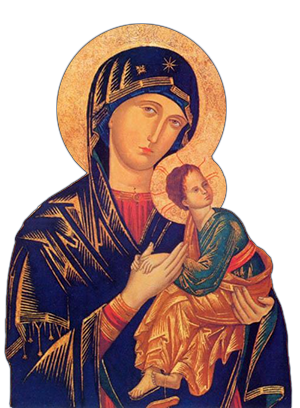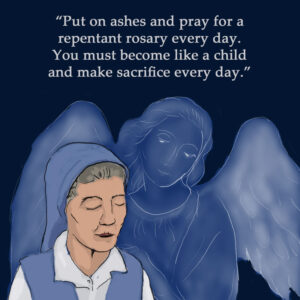Father Mitch Pacwa's homily for January 27th, 2021
Today we are continuing on in Chapter 10 of the letter to the Hebrews. This chapter is pulling together the very rich arguments of the previous nine chapters.
He had been setting out step-by-step each of the points that were necessary for them to understand, and that included the divinity of Christ in Chapter 1, his humanity in Chapter 2, and then explaining why he had to be a priest according to the order of Melchizedek. He was from the tribe of Judah, as the messiah had to be. So as such, it could not be one of the priests in the order of Aaron. But he fulfills the prophecy of Psalm 110: that there would be a priest of the order of Melchizedek. And that this offering is not of some things, but it is the infinite self gift of God the Son. He is the priest who offers himself. All of these points he had been making very carefully in these previous nine chapters, now he brings it together.
One of the points–again you have to go over. And that is why we are taking a number of days in the readings to go over this passage. It is a very important one for us to contemplate. At this point, in verses 11 – 18, he is emphasizing that this priesthood of Melchizedek is superior to that of Aaron. The reason is that they have to keep offering the sacrifices. By the way, that is a little clue here that this indicates Hebrews was written in the 60’s, probably before 66 AD. Because the temple was destroyed in August of 70 AD. He assumes it is in full swing; that they are still offering the sacrifices that are still going on and that they are still bringing these daily sacrifices, as well as the annual sacrifices of different bulls and goats and other offerings. But those cannot take away sins. Why not?
It all goes back to the understanding of the nature of sin. That because it is the one that we offend that gives sin its seriousness. That God is the one who is offended, and it has that infinite quality because it is the infinite God, who is offended by our sin. These animals, as important as they might be to the person offering, and as expensive as they might be, as it might be for us the equivalent of taking your vehicle–a vehicle you might’ve spent thousands of dollars on, and once you make the final payment, you burn it up as a sacrifice. You know this would be a tough thing to do. This is a few hundred dollars. This is a major part of the economy of the individual, but that is an important sacrifice to give a bull. But, it still is nothing compared to the power of our sins.
Our sins have this infinite quality and eternal quality. That is why hell is eternal. It has this aspect of it that would send us there forever. And in the face of that, we see that Christ is superior because he offered one sacrifice for sins: himself. That is why these arguments that he presents are so tightly woven. If he had not shown from scripture that Christ is God the Son, then it would not be an infinite sacrifice. But because it is the sacrifice of God the Son, it is infinite; there is no limit to it, there is no end to it: it is eternal.
And because it is the infinite and eternal Son of God that is the one sacrifice for sin, then we can see that he can give us eternal life. Our sin can bring us eternal condemnation. But his one sacrifice of himself brings eternal life. That is what is at stake and that this one sacrifice is for sins and at that point he keeps on going. This is a brilliant part of the letter to the Hebrews.
It is one of the most important aspects of our theology of understanding the ascension of Christ; that Christ ascends into heaven to the Right Hand of the Father. Again, a quotation from the same Psalm 110, that it predicted the priesthood according to the order of Melchizedek; that also is the psalm that says the Lord said to my Lord, sit at my right hand. And why is that? Because God is in the truest temple. Any other place of worship is only a reflection; a model of heaven. That is why our liturgy should raise us up towards heaven. That is why there is a great dignity in the liturgy. We do not bring the liturgy down to a mere human level. We let the liturgy raise us up to the heavenly level. This is the purpose of the mass. And the purpose of our music and the beauty of our churches. It is meant to be that reflection of heaven, but Christ is in the temple of heaven at the Right Hand of the Father, in that his one offering of himself, is eternally there in front of the Father. There is no time when he is not before the Father. There is no moment when he is not pleading for us before the Father, giving himself for us.
And this becomes a perpetual sacrifice that can remit sins committed at any point in history. There is no limit to that. That is why it is the one sacrifice, and he is seated forever. We can never forget this aspect either: that it is infinite sacrifice, so that there is no sin we commit that is more powerful than the death of Jesus Christ on the cross. His death is stronger than any of the sins we commit. No matter how frequent, no matter how grave, his death is more powerful. And because of that, we can come to him and receive this forgiveness.
This then brings in the argument that he brought in that this is part of a new covenant. The old covenant had the old priesthood and the old sacrifices. But he quotes Jeremiah 31, promising that there would be a new covenant. Israel had broken the old one. And Jeremiah said there will be a new one. You broke it, but there will be a new one. Ezekiel, at the same time in the 590s and 580s, had said you broke the covenant, but he also had the same message: God will give you a new covenant.
And the only one in the Bible who ever speaks of this new covenant being accomplished is Christ. He does it at the first Eucharist. And we repeat his words at every Eucharist. That his blood is the blood of this new covenant.
This is why, and this is so key for us to understand, and people outside of the Catholic faith to understand: we are not crucifying Jesus again and again–people say that. People say that to Catholics, and sometimes Catholics do not know how to respond to that. That is the last thing we do. What is going on at Mass is that we are re-presenting that one sacrifice of Jesus Christ. This is not a separate offering. It is becoming united with that one offering of Christ; that eternal act of offering himself that happens in heaven forever. What is happening in eternity, he told us to make present in time. We live in time, we are not in heaven yet, and we have to experience that now.
Many people outside the Catholic Church will talk about how, by their faith, they are washed in the blood of the lamb. They are not crucifying Christ again. They do not mean that. They know that, by their act of faith, they are becoming united with that one sacrifice. And our acts of faith, and our spiritual communions, have the same effect. They unite us with that one sacrifice.
But here at Mass, we are united with that one eternal sacrifice, in time, in this sacrament. And we are simply entering into that ministry. It is as if heaven breaks down the barrier between the earth and the throne of God. And a light ray of that sacrifice, that presence, that offering is here. That is why we do speak of the Mass as the sacrifice of the Mass. Not sacrificing Christ again, but entering into it
And we cannot go to the other side and say that this is not a sacrifice but just a community celebration. Such superficiality in regard to the Mass, of course it drives people away. Why would you come for just a celebration of us? If Jesus Christ’s sacrifice on the cross is not what we are attracted to, drawn to, then why would we come? This is a reality that enters us into this deepest mystery of our faith, and this is where we see that Our Lord will put this new covenant, and put his law in our minds and hearts. He will transform us from the inside. Again, as Jeremiah and Ezekiel said would be true of the New Covenant, so also did Christ do this for us.
And in that sense we briefly mention the Gospel. Are our minds and hearts the kind of ground into which the seed of God’s word can enter? Are these minds of the New Covenant in which the words of Christ enter and germinate and produce much fruit, or do we allow ourselves to become hardened. The first group of seed fell on the pathway. And what makes a path hard? People stepping on it. A lot of people do that in our culture. It hardens us. It keeps the Word of God out.
We have a lot of people that want to keep the Word of God away from our hearts–away from its fruitfulness. They do not want us to hear the Scripture coming into fruition. That is what we are celebrating this week: praying for an end to abortion and the other attacks on life. There are people who want to side with God’s enemy, death and sin. And we instead want to let the Word of God enter into our hearts. We do not make a covenant with death. That is what Isaiah warned against. And everyone who is pushing for abortion and this new Executive Order to give foreign aid on the condition that you will abort your babies, that is a covenant with death. We seek a covenant with the Eternal One, who gives eternal life. This is what we are celebrating at this Mass and every Mass.
Transcript provided by WQPH



